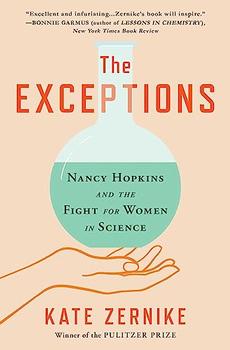Summary | Excerpt | Reading Guide | Reviews | Beyond the Book | Readalikes | Genres & Themes | Author Bio

Critics' Opinion:
Readers' Opinion:
First Published:
Feb 2023, 432 pages
Paperback:
Feb 2024, 432 pages
 Book Reviewed by:
Book Reviewed by:
Rose Rankin
Buy This Book
Budgie was the more outgoing parent, the driver of her girls' efforts and success. She had impressed upon Nancy and Ann the need for women to make an independent living, though she also told them that having children was the most satisfying thing they could do. She herself had grown up hearing the story of her grandmother who had been left widowed with eight children and impoverished after her husband, a doctor in rural England, fell from his horse returning from a house call. Budgie recalled the despair of the Great Depression, seeing people jump from windows after losing their savings and jobs. She had given up her ambitions to be a painter when she realized that she could not make a living as an artist. She had a first-generation American's faith in the transformative power of education and had early on decided that the girls should go to Harvard and that the best way to get to Harvard was through Spence.
Ann had gone off to Cambridge first. Nancy skipped tenth grade—Budgie worried she'd be languishing at home—and followed the next year, in September 1960.
Of course, the Doe girls could not be Harvard students; they were admitted to Radcliffe, which had been founded in 1879 after Harvard rebuffed women's repeated attempts to apply. "The world knows next to nothing about the natural mental capacities of the female sex," Harvard's president Charles Eliot declared in his inaugural address in 1869. "Only after generations of civil freedom and social equality will it be possible to obtain the data necessary for an adequate discussion of women's natural tendencies, tastes, and capabilities."
Radcliffe started as an experiment, dreamed up largely by daughters and wives of Harvard professors, to educate young women "with the taste and ability for higher lines of study." For decades, Radcliffe students relied on Harvard professors who were willing or interested enough in the extra paycheck to cross Massachusetts Avenue to teach women in separate classrooms around Radcliffe Yard. Harvard allowed 'Cliffies into its lecture halls only during World War II, when the number of young men going off to war put the university at risk of losing tuition dollars. This arrangement of "joint instruction" continued throughout the twentieth century. And during Nancy's years in the early 1960s, everyone, from the presidents of both institutions to the Radcliffe alumnae to the Harvard Undergraduate Council, still agreed that full integration would be a step too far. By quota, Radcliffe was allowed to admit one girl, as they were still called, for every four men of Harvard. It was an exclusive set; while Radcliffe graduated more Black women than the other colleges of the Seven Sisters, there were still only two or three in a class of roughly three hundred each year. There were none in Nancy's class.
The president of Harvard, Nathan M. Pusey, was the first since the founding of Radcliffe to have a daughter but showed relatively little interest in the education of women; he declined to attend the dedication of a new graduate center at Radcliffe in 1956, noting in his papers that it conflicted with the Harvard-Penn football game. In speeches and reports Harvard officials referred to the university as "she" with the reverence one would a goddess or an ocean liner. Actual women had to enter the Faculty Club through the back door and eat in a separate dining room. They were not allowed in the main library, or Harvard's undergraduate dining halls except as someone's date (the Harvard man had to pay for her meal). For the most part, Radcliffe girls aligned with the expectation that they be the ornamental sex: "We know that beauty is only skin deep, but you don't have to look as though you lived only for things of the mind," a Radcliffe student handbook from the 1950s tsked, explaining the rules against pants downstairs in the dormitories.
Those rules persisted through Nancy's time at Radcliffe. But the institution had begun to rethink women's education, starting with the arrival of Mary Ingraham Bunting, a microbiologist who in 1960 became Radcliffe's fifth president and its first with a PhD.
Excerpted from The Exceptions by Kate Zernike. Copyright © 2023 by Kate Zernike. Excerpted by permission of Scribner. All rights reserved. No part of this excerpt may be reproduced or reprinted without permission in writing from the publisher.





The House on Biscayne Bay
by Chanel Cleeton
As death stalks a gothic mansion in Miami, the lives of two women intertwine as the past and present collide.

The Flower Sisters
by Michelle Collins Anderson
From the new Fannie Flagg of the Ozarks, a richly-woven story of family, forgiveness, and reinvention.

The Funeral Cryer by Wenyan Lu
Debut novelist Wenyan Lu brings us this witty yet profound story about one woman's midlife reawakening in contemporary rural China.
Your guide toexceptional books
BookBrowse seeks out and recommends the best in contemporary fiction and nonfiction—books that not only engage and entertain but also deepen our understanding of ourselves and the world around us.